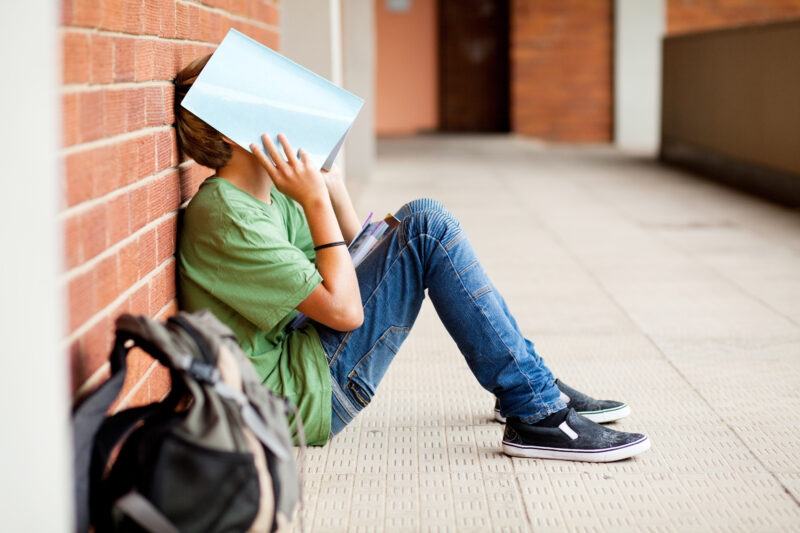
For some kids, anxiety can be short-lived nervousness at the start of the school year. For others, school can be a constant source of stress that can lead to intense anxiety.
According to the Anxiety and Depression Association of America, school-related anxiety affects 2 to 5 percent of children and teens, commonly between ages 5 and 6, 10 and 11 and transition times, such as entering middle and high school.
While it may be normal to be nervous, know when it goes beyond everyday stress. Dr. Sumru Bilge-Johnson, Akron Children’s director of the child and adolescent psychiatry fellowship program, offers parents a variety of physical and emotional signs of school-based anxiety to watch for in kids:
- Upset stomach
- Vomiting
- Diarrhea
- Headaches
- Difficulty sleeping
- Tantrums
- Becoming clingy to parents
- Reluctance or refusal to go to school
- Crying
- Moodiness
“Parents and caregivers may also notice that the behavior comes up more often after the weekend, holidays or vacation,” she said.
How to reduce school-related stress
When dealing with feelings of anxiety, Dr. Bilge-Johnson suggests following these 10 tips to help kids of all ages reduce stress related to school:
- Role-play at home. This approach can be especially useful for younger children. During playtime, pretend with your child that his stuffed animals have some of the same anxieties he does and show how the stuffed animal deals with anxiety successfully.
- Read stories together about school. You might ask your local librarian for suggestions of books that illustrate children having difficulty going to school, but then overcoming this worry. Some books about separation anxiety, like “The Kissing Hand,” may also be helpful for younger children.
- Build up your child’s self-confidence. This can be as simple as giving your child tasks and asking for help at home and then telling him what a good job he’s done, like brushing his teeth or clearing the table after dinner. It is important to give your child a sense that he can manage some things on his own. Also, encouraging your child to try new things and having peer interactions, like joining a sports team, to develop friendships can boost his self-confidence.
- Teach your child relaxation techniques. An easy one for children is to “smell a flower” by breathing in through their nose and “blowing out a candle” by breathing out through their mouth. Teach them to do this breathing technique 5 – 6 times when feeling stressed to help them calm down.
- Carpool with people in your neighborhood. By having another child in the car, your child won’t feel like he’s going to school alone. For children who ride the bus, encourage him to invite neighborhood children over for play dates so he gets to know children better who are on his bus.
- “Normalize” his anxiety. Let your child know it’s OK to be nervous, but it isn’t OK to let it stop him from participating in school.
- Develop a routine and stick to it. Have a bedtime routine. Lay out clothes and pack lunches and backpacks the night before. A morning routine is just as important. Routines are comforting. They help children know what to expect daily and reduce stress.
- Discuss scenarios. Talk about what they should do if they forget their lunch or lunch money, where each grade sits, and new ways to find someone to play with at recess. Encourage them to participate in activities, such as kickball or tag.
- Help children and teens prepare for bullying. Teach kids to talk to you, a teacher or guidance counselor if the teasing crosses a line to give them the tools to handle it. To normalize open communication, Dr. Bilge-Johnson suggests asking each family member at the dinner table to state one good thing and one bad thing happened that day.
- Talk to your school’s guidance counselor and/or your child’s teachers to develop an intervention plan if anxiety starts impacting school success and learning. Remember, children can pick up and absorb emotions of their parents, so it’s important to recognize and manage your own parental anxiety, as well.
“It’s important to reach out to a mental health specialist for a specific intervention plan. The specialist can also work with your child’s school to implement the plan,” said Dr. Bilge-Johnson. “School-based anxiety disorders can have lasting effects on children, such as developing other anxiety disorders, impacting their self-esteem and making them prone to depression, along with missing school, which can put them behind their peers both academically and socially.”
If your child is struggling with anxiety or other mental health concerns, contact Akron Children’s Lois and John Orr Family Behavioral Health Center at 330-543-5015.










